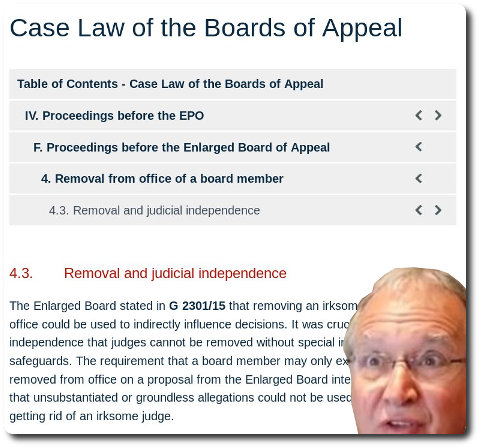

LAST WEEK we wrote two articles in which we mentioned how the EPO's Judge Corcoran was -- without warning -- removed from his office (never to return to it since 2014). Apparently Corcoran's last decision/unfinished work was against a software patent of an EPO partner (maybe a coincidence) and whatever he's accused of -- mainly relaying true information about Team Battistelli -- is something that hundreds if not thousands of other EPO workers could be accused of at the time (many messages had been relayed and were circulating regarding Battistelli and his dodgy 'bulldog' from Croatia).
"Apparently Corcoran's last decision/unfinished work was against a software patent of an EPO partner (maybe a coincidence) and whatever he's accused of -- mainly relaying true information about Team Battistelli -- is something that hundreds if not thousands of other EPO workers could be accused of at the time (many messages had been relayed and were circulating regarding Battistelli and his dodgy 'bulldog' from Croatia)."IP Kat finds no time to cover EPO scandals anymore (we know why). Rose Hughes (Reddie & Grose LLP), however, found time to cover things like this just before the weekend. "Last month," she wrote, "the EPO published it's [sic] sixth ever decision granting a petition for review (R 4/17). Granted petitions for review are notoriously difficult to obtain, as the EPO attempts to balance the need for the legal certainty of Board of Appeal (BoA) decisions, and the right to challenge flagrant violations of EPO procedure."
Well, haven't violations of EPO procedure/s become far too routine under Battistelli? We've lost count of how many such violations of EPO procedures we already covered. Including against BoA...
"Recently, the EPO Opposition Division opposed CRISPR patents, or at least one such patent loosely representative of the whole lot.""Even if has [sic] been summarily dismissed," noted the commenter. "it does not appear that the opposition division did exercise its discretion in an improper way. It look more than a hidden clarity objection. It is in any case doubtful that the proprietor will consent to this ground be introduced in the new appeal procedure."
We remain rather disturbed/worried that after Judge Corcoran had been thrown somewhere (probably in another country, for the mere pretense of minimal compliance with ILO-AT rulings) the EPO's management got away with it. As usual. Above the law.
Recently, the EPO Opposition Division opposed CRISPR patents, or at least one such patent loosely representative of the whole lot. The CRISPR situation at the EPO was covered here almost a dozen times this year, e.g. in [1, 2].
The patent trolls' lobby, IAM, revisited the subject before the weekend when it said:
The University of California – which pioneered the foundational CRISPR Cas-9 methods (though it only developed these for use in bacterial cells) – is seeking to invalidate the Broad Institute’s core US patent for the specific use of CRISPR Cas-9 in plant and animal cells on the grounds that it interferes with its own IP rights.
It claims that the Broad Institute’s innovations were, at the time of application in 2012, merely an obvious application of the technology it had already pioneered and filed a patent for. The Broad Institute denies this, arguing that its invention was non-obvious and therefore separately patentable.
"What will the EPO's BoA be able say about CRISPR patents, knowing that a colleague has already been targeted by Battistelli and all the Boards sent to 'exile' in Haar, presumably in an act of collective retaliation (like sending a young student to detention near the door, or office space that is merely rented in a distant suburb)?"Let's face it; the EPO is still in a serious crisis -- one that IP Kat is unwilling to speak about any longer (no more than a couple times per year).
Patent maximalists other than IAM meanwhile speak about CAFC's and the Supreme Court's decision in Promega Corp. v Life Technologies Corp.
To quote Patent Docs:
In reversing the Federal Circuit and remanding the case, the Supreme Court, in Life Technologies Corp. v. Promega Corp., determined "that a single component does not constitute a substantial portion of the components that can give rise to liability under ۤ271(f)(1)." As the Supreme Court noted, Life Technologies manufactured all but one component of its kits in the United Kingdom -- manufacturing Taq polymerase in the United States and then shipping the Taq polymerase to its United Kingdom facility to be combined with the other four components of the kit.
[...]
The opinion conceded that "[t]his is an unusual case," noting that "[p]atent owners who prove infringement are typically awarded at least some amount of damages." However, in this case, Promega waived its right to a damages award "when it deliberately abandon[ed] valid theories of recovery in a singular pursuit of an ultimately invalid damages theory." The Federal Circuit therefore concluded that the District Court did not abuse its discretion by declining to give Promega "multiple chances to correct deficiencies in its arguments or the record." As a result, the panel also affirmed the District Court's denial of Promega's motion for a new trial.